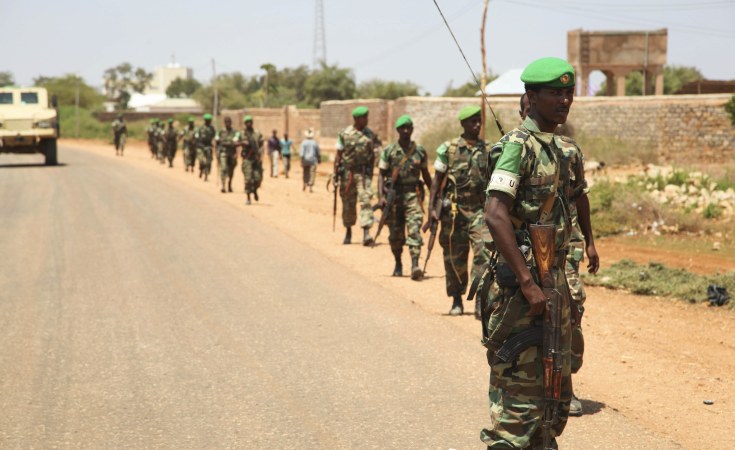Eleven Somali government soldiers were killed and three others injured in a roadside explosion Monday in the southwestern Gedo region, officials said, as the African Union peacekeeping force began a second round of troop withdrawals.
The explosion targeted a convoy of military vehicles between the towns of Luuq and Doolow, deputy governor of security and policy for the region, Osman Nuh Haji, told VOA Somali.
"The technical vehicle they were riding in has been hit by an explosion," Haji said.
He said the vehicle was burnt and destroyed.
The al-Shabab militant group claimed responsibility for the roadside explosion.
Haji initially insisted only two soldiers were killed and two others were injured. But VOA Somali spoke to multiple sources including a senior regional official who said 11 soldiers were killed in the attack, and three others injured.
Among the wounded is a commander with the 10th brigade of the 43rd Division of the Somali National Army, Rashid Bohol. "He was injured but his injury is light, he is walking and working," Haji said.
Meanwhile, Somali government officials and parliamentarians arrived in the town of Amaara in the central Galmudug state on Tuesday, hours after federal troops supported by local fighters seized it from al-Shabab.
Before Amaara, troops captured a series of nearby towns and villages, including Ba'adweyne, Qay'ad, Shabelow and Qodqod.
Government troops and local forces recently resumed seizing territories from al-Shabab, after a pause triggered by an August 26 attack in the village of Cowsweyne that killed dozens of government troops.
The ongoing military offensive comes as the African Union Transmission Mission, or ATMIS, in Somalia announced the start of the second round of a planned troop withdrawal.
Burundian troops this week handed over their base in the town of Biyo Adde in the Middle Shabelle region to government forces, the first of 10 forward operating bases to be transferred.
The new drawdown will see the reduction of the AU peacekeeping force to 13,586 soldiers by the end of September. The first round of the drawdown was concluded in June, and 2,000 troops left the country.
Conditions should be attached to the continuation of the drawdown, said Brigadier General Abdirahman Mohamed Turyare, the former director of the Somali National Intelligence and Security Agency, or NISA.
He said resources such as the military equipment and funds allocated for the AU troops should be made available to the Somali army to strengthen military operations against al-Shabab.
"If they cannot transfer all, at least some of it," Turyare said.
Turyare said the impact of the drawdown on Somalia's security will depend on the success of the ongoing military operations.
"If the government makes good progress [on] the liberation campaign in the next months it can cope with the reduction of AU troops," he said.
"If it doesn't succeed, it will impact because the [AU] troops are holding areas; people living in those areas and [Somali] troops have them as a company. It will impact if the operation prolongs."


